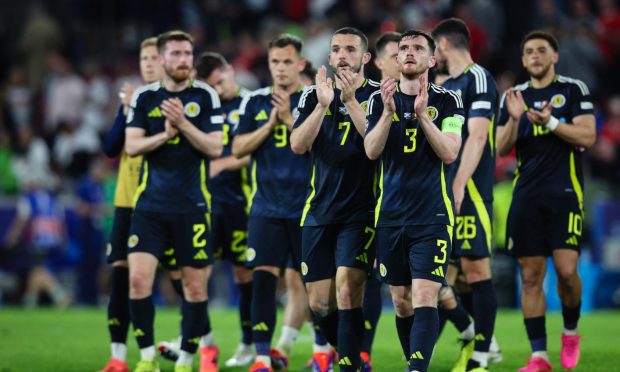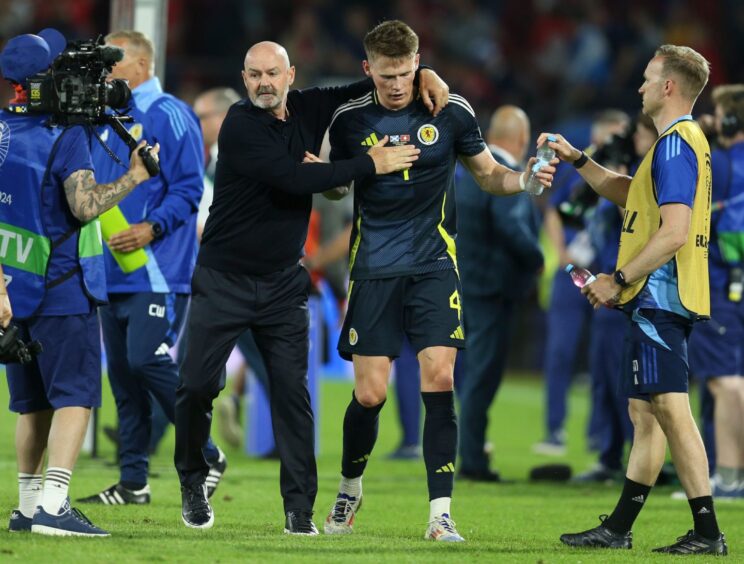Two games in and Scotland still have a chance of making history after a couple of performances which could hardly have been more contrasting.
Munich was a shambles, and we never looked like laying a glove on the hosts. The defence was uncertain from the start, Angus Gunn had an off day, and Ryan Porteous – a surprise inclusion for me – showed the rashness which scarred his time with Hibernian.
Across the first round of fixtures, Scotland put in the worst display of the 24 countries on show.
A few days later, it was completely different against Switzerland. That night, we saw the intensity and desire lacking against Germany, the team was more organised, and created enough chances to claim we might actually have won the match.
The draw means the Scots are in exactly the same position as in our three previous tournament appearances, one point from two games, and having fallen at the final hurdle at Euro 96, France 98 and Euro 2020, Steve Clarke has to find a way to buck that trend.
Given the six goal advantage the Swiss hold, even if they lose and we win, second in the group is a forlorn hope, so Scotland can only reach the knock-out stage as one of four best third-placed sides.
It is too early to make a full assessment of that, and the heavy defeat against Germany might yet count against them, but a victory over Hungary will at least put some pressure on those countries yet to complete their groups.
Despite the improvement against Switzerland, I do fear the tournament came about nine months too late for the squad.
It was a better showing by the players, but that was mainly down to the physical aspect of their game rather than outstanding technical ability, and our key players, especially those in the offensive area of the team, have not shone in the way they are capable of. No-one has stepped up; no-one has particularly enhanced their reputation.
Compare the Scots to what we saw from the likes of Austria and Georgia, two sides we have played and beaten in recent years, but who instantly appeared at home on the big stage.
Albania pushed Italy all the way and drew impressively with Croatia, Slovakia beat Belgium, and Romania hammered Ukraine. All five are below Scotland in the UEFA rankings, in some cases considerably below, and yet immediately coped better with the demands of finals football.
They all also have individuals who have caught the eye, players who were able to make an impact in the way our top stars have not.
Overall, it has been an excellent finals so far with, in the main, teams putting the focus on attack. There has been some outstanding entertainment, often from games that looked less attractive; Turkey’s win over Georgia and the 2-2 draw between Croatia and Albania are prime examples.
The giants, the pre-tournament favourites, all appear to be revving up nicely, and Euro 2024 has the potential to become one of the classic major competitions.
Even VAR is working
A word too for the refereeing.
The officials all seem keen to keep the play flowing and are allowing more contact than we have become used to in recent years. Tackles which have instantly been penalised in the more sanitised modern game are being allowed, and the matches have benefited as a result. Hopefully that will continue throughout.
Even VAR appears to be working and has been a positive, a real contrast to the negative impact it has on our domestic football.
Up to now, there has been just the one major questionable call, the disallowing of Romelu Lukaku’s ‘equaliser’ against Slovakia after the ball barely brushed the fingertips of Loïs Openda. That goal should have stood.
The introduction of the semi-automated system for offside has also been a plus with decisions being reached within seconds and the TV audience shown the evidence soon after.
After all the teething problems and controversy, we have finally seen in this tournament how VAR can be a valuable tool. I would hope that studying the progress made will be part of the review being carried out by the Scottish FA.

